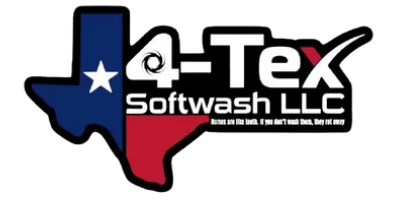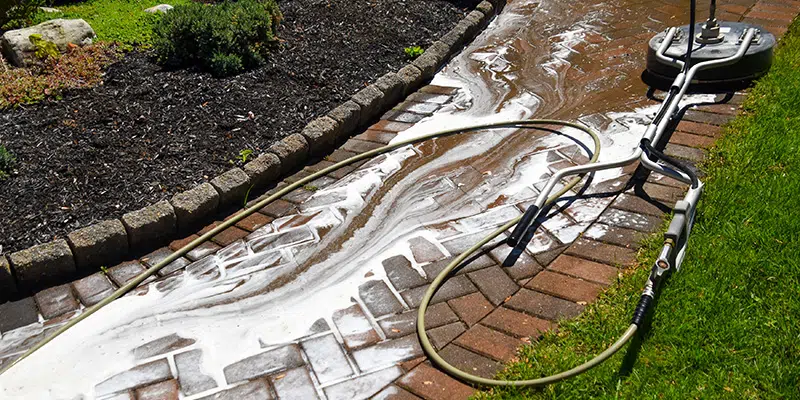Soft washing has emerged as a superior method for cleaning and maintaining the exterior surfaces of homes and buildings. Unlike traditional pressure washing, soft washing relies on specialized “soft washing chemicals” to safely and effectively remove dirt, grime, algae, and other stubborn stains without risking damage to surfaces or landscaping. This guide dives deep into everything you need to know about soft washing chemicals, from their types and benefits to safe application techniques.
Soft Washing
Understanding Soft Washing
Soft washing is a cleaning technique that uses low-pressure water combined with specialized cleaning solutions or “soft washing chemicals” to remove unwanted substances from various surfaces. This method is particularly effective on roofs, sidings, decks, and patios, where high-pressure washing might cause damage.
The Role of Chemicals in Soft Washing
The success of soft washing largely depends on the “soft washing chemicals” used. These chemicals are designed to target specific stains and organisms, such as mold, mildew, and algae, ensuring a thorough cleaning without the need for high pressure.
Benefits of Soft Washing Over Traditional Methods
Choosing soft washing over traditional methods means opting for a solution that not only cleans effectively but also preserves the integrity of your property. “Soft washing chemicals” penetrate and neutralize growths and stains, offering a longer-lasting clean than high-pressure washing alone.
Types of Soft Washing Chemicals
Common Chemicals Used in Soft Washing
Among the “soft washing chemicals” commonly used, sodium hypochlorite stands out for its effectiveness against a wide range of organic stains and growths. Surfactants are another crucial component, helping the solution adhere to surfaces for more efficient cleaning.
Specialized Chemicals for Tough Stains
For more stubborn problems like heavy mold or grease stains, specialized “soft washing chemicals” are available. These formulations are designed to tackle the toughest jobs without harming the surface being cleaned.
Eco-Friendly and Biodegradable Options
Increasingly, the market is seeing a rise in eco-friendly “soft washing chemicals.” These solutions are not only effective at cleaning but also safe for the environment, often being fully biodegradable and non-toxic to surrounding plant life.
Preparing for Soft Washing
Safety Equipment and Protocols
When handling “soft washing chemicals,” safety should be your top priority. Personal protective equipment (PPE), such as gloves, goggles, and respirators, is essential to protect against chemical burns and inhalation risks.
Mixing and Dilution Guidelines
Understanding the correct dilution ratios for “soft washing chemicals” is key to their effective use. Always follow manufacturer guidelines to ensure safety and effectiveness, adjusting as necessary for specific cleaning tasks.
Pre-Cleaning Assessment and Surface Preparation
Before applying any “soft washing chemicals,” conducting a thorough assessment of the area and preparing surfaces for treatment will help achieve the best results. This means clearing debris and considering any plants or materials that might be sensitive to the chemicals used.
Application Techniques for Soft Washing Chemicals
Best Practices for Applying Chemicals
Applying “soft washing chemicals” correctly ensures the safety of the applicator, the integrity of the building materials, and the protection of surrounding vegetation. Techniques vary based on the chemical used and the surface being cleaned, but uniform application and adherence to manufacturer guidelines are universal best practices.
Temperature and Weather Considerations
The effectiveness of “soft washing chemicals” can be influenced by weather conditions. Optimal application occurs in mild weather, avoiding extremes that can evaporate chemicals too quickly or prevent them from acting effectively on the target surface.
Timing and Dwell Time
The concept of dwell time, or the period “soft washing chemicals” are left on the surface to work, is critical for effective cleaning. This duration allows the chemicals to penetrate and break down the dirt, algae, and other substances fully.
Soft Washing Equipment Essentials
Choosing the Right Soft Washing System
Investing in the right equipment is as crucial as selecting the appropriate “soft washing chemicals.” A quality soft washing system delivers the right pressure and flow rate, ensuring chemicals are applied effectively and safely.
Maintenance and Care for Soft Washing Equipment
Routine maintenance of your soft washing equipment extends its lifespan and ensures consistent performance. This includes regular checks and cleaning of nozzles, hoses, and pumps to prevent clogging or corrosion from the chemicals used.
Innovations in Soft Washing Technology
The industry continually innovates, developing more efficient and safer “soft washing chemicals” and equipment. Staying informed about these advancements can lead to better cleaning results and more streamlined operations.
Handling and Storage of Soft Washing Chemicals
Safe Handling Practices
Safe handling of “soft washing chemicals” is non-negotiable. Adhering to proper safety protocols protects users from chemical burns, respiratory issues, and environmental harm.
Storage Solutions and Best Practices
Proper storage of “soft washing chemicals” prevents accidents and ensures the chemicals’ efficacy is preserved. Cool, dry, and ventilated areas, away from direct sunlight and extreme temperatures, are ideal.
Regulations and Compliance
Familiarity with local regulations governing the use and storage of “soft washing chemicals” is essential for compliance. This knowledge helps avoid legal issues and ensures community and environmental safety.
Troubleshooting Common Issues with Soft Washing Chemicals
Dealing with Ineffective Cleaning Results
When “soft washing chemicals” do not achieve the desired cleaning results, revisiting the chemical mix, application method, or dwell time can often identify and rectify the issue.
Chemical Stains and Damage to Surfaces
Misapplication of “soft washing chemicals” can result in stains or damage. Testing chemicals on inconspicuous areas before widespread application can prevent such issues.
Environmental Impact and Mitigation
Responsible use of “soft washing chemicals” includes measures to minimize runoff and protect the environment. Strategies such as capturing runoff or using eco-friendly chemicals can mitigate adverse effects.
Professional Soft Washing Services vs. DIY
When to Hire a Professional Soft Washing Service
Complex projects or those involving high or difficult-to-reach areas often warrant hiring a professional “soft washing chemicals” service. Professionals bring experience, equipment, and an understanding of chemical applications that can be challenging for DIY enthusiasts to match.
Tips for DIY Soft Washing
For those determined to tackle soft washing DIY, thorough research and adherence to safety practices are paramount. Small, manageable projects are best suited for DIY efforts, with careful attention to chemical handling and application techniques.
Cost Comparison and Value Analysis
While DIY projects might seem cost-effective, professional services offer value through expertise, efficiency, and safety. Considering the potential costs of equipment, chemicals, and potential property damage, professional services often present a more cost-effective solution in the long term.
Frequently Asked Questions (FAQs)
What are soft washing chemicals?
Soft washing chemicals are specially formulated solutions used in the soft washing process. They often contain a mix of detergents, surfactants, and sometimes bleach (sodium hypochlorite) to effectively clean exterior surfaces without high-pressure damage.
How do softwashing chemicals work?
These chemicals work by breaking down dirt, grime, mold, mildew, and algae at a molecular level, allowing them to be easily rinsed away with low-pressure water. Surfactants in the mix help the solution stick to surfaces longer for a deeper clean.
Are soft washing chemicals safe for plants and landscaping?
When used correctly and precautions are taken, such as diluting the solution properly and rinsing plants and grass with water before and after application, soft washing chemicals can be safe around landscaping. Some products are specifically designed to be eco-friendly and biodegradable.
Can I make my soft-washing chemicals?
While some professionals and DIY enthusiasts mix their solutions, it’s important to understand the risks and proper ratios. Commercially available “soft washing chemicals” are recommended because they’re formulated for safety and efficacy, with clear usage instructions.
What surfaces can be cleaned with soft washing chemicals?
Soft washing can be used on a variety of surfaces, including roofs, siding, decks, fences, patios, and even outdoor furniture. The key is choosing the right chemical mix for the surface material and type of stain or growth.
How often should I use soft washing chemicals on my property?
The frequency depends on several factors, including climate, surface material, and the presence of trees or water sources nearby. Generally, soft washing is recommended every 1-2 years to maintain cleanliness and prevent buildup.
Do I need to rinse off soft washing chemicals after application?
Yes, after allowing the chemicals to dwell on the surface for the recommended time, they should be thoroughly rinsed off with low-pressure water to prevent any potential damage or residue.
Are soft washing chemicals harmful to pets?
As with plants, precautions should be taken to ensure pets are not exposed to the chemicals. Keep pets indoors and away from treated areas until the solution has been fully rinsed away and the area is dry.
Can soft washing chemicals remove oil stains?
Yes, there are specific formulations within the range of “soft washing chemicals” designed to tackle tough stains like oil and grease, especially when combined with the right surfactants.
How do I choose the right soft-washing chemicals for my needs?
Consider the type of stains or growths you’re dealing with and the surface material you’re cleaning. Manufacturers often provide guidelines on which solutions work best for different scenarios. When in doubt, consulting with a professional can ensure you select the most effective and safe option.
Is professional training required to use soft washing chemicals?
While not strictly required, professional training or thorough research is highly recommended to understand the proper use, safety precautions, and effective techniques for soft washing. Incorrect use can lead to damage or ineffective cleaning.
Where can I buy soft washing chemicals?
Soft washing chemicals can be purchased from professional cleaning supply stores, online retailers, and sometimes local hardware stores. Look for reputable brands and products specifically designed for softwashing applications.
Conclusion
This guide has explored the crucial role of “soft washing chemicals” in maintaining and cleaning properties effectively. Understanding the types of chemicals available, their safe application and the benefits of professional services can empower homeowners and businesses to make informed decisions about property maintenance.
As technology and environmental awareness progress, the future of “soft washing chemicals” lies in safer, more efficient formulations and application methods. Staying abreast of these trends ensures that property maintenance practices remain effective and sustainable.
Call to Action
Whether you’re considering a DIY project or seeking professional “soft washing chemicals” services, the importance of informed decision-making cannot be overstated. Evaluate your needs, research your options, and choose the path that best ensures the longevity and beauty of your property.






